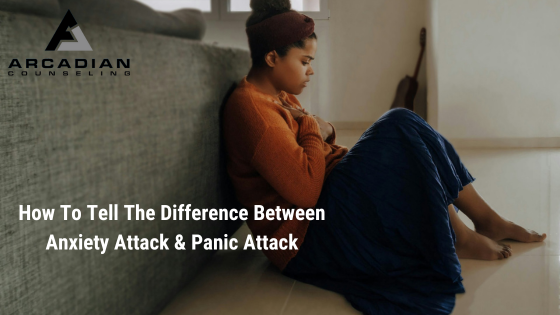Today terms like “anxiety attack” and “panic attack” are used interchangeably, which only leads to confusion regarding their meanings and implications. But what’s the difference between anxiety attack and panic attack? While both are intense emotional experiences, they are a distinct event with unique characteristics and triggers. It’s best to know the difference between anxiety attacks and panic attacks for effective treatment.
Difference between anxiety attack and panic attack
Anxiety Attacks
Anxiety attacks are sudden episodes of extreme concern, fear, or unease that occur when there is a perceived threat or source of stress. They usually develop slowly and are often triggered by certain situations or thoughts that provoke discomfort. One may feel a sense of impending disaster, along with physical symptoms like shaking, sweating, fast heartbeat, and breathing difficulties. The severity of an anxiety attack can range from slight discomfort to intense distress, depending on the your anxiety level and coping strategies.
A key characteristic of anxiety attacks is their association with identifiable stressors or triggers. These triggers can be external, such as social situations, work deadlines, or financial pressures, or internal, such as intrusive thoughts or memories.

Additionally, anxiety attacks are typically less intense and shorter in duration compared to panic attacks. While they can be debilitating and distressing, the anxiety usually subsides once the triggering stimulus is removed – or the person learns effective techniques for managing the difficult thoughts and feelings associated with the triggering event.
Panic Attacks
On the other hand, panic attacks are sudden, intense episodes of fear or discomfort that peak within minutes and often occur without any apparent trigger. Unlike anxiety attacks, panic attacks can strike unexpectedly, even in the absence of external stressors or perceived threats. Someone experiencing a panic attack may describe feeling as though they are losing control, having a heart attack, or going crazy. Physical symptoms associated with panic attacks may include chest pain, dizziness, nausea, sweating, and tingling sensations.

The trademark feature of panic attacks is the overwhelming sense of terror or impending doom that accompanies them. This sense of dread is disproportionate to any actual danger present, highlighting the irrational nature of panic attacks. Essentially, you feels like you’re dying. Let me bottom line this for you: Panic attacks can be one of the most terrifying experiences. Panic attacks are most commonly mistaken for heart attacks and are often the reason many people seek emergency room treatment.
Unlike anxiety attacks, which are triggered by specific stressors, panic attacks can occur unpredictably and may appear to have no discernible cause. This unpredictability is what makes panic attacks particularly distressing, as many people live in fear of when the next attack will strike. THIS is panic disorder, the fear of experiencing a panic attack. And for many people who live with this disorder, it can be debilitating and life-altering. Panic attacks can significantly impair daily functioning and quality of life, leading to avoidance behaviors and social isolation.

Anxiety attacks and panic attacks definitely share similarities. The emotional intensity and physical symptoms can be quite similar. Where they differ however, is their triggers, onset, and duration. If you’re struggling with anxiety it’s helpful to understand these distinctions – especially when it comes to managing the symptoms. Additionally, what most don’t realize is that panic disorder is NOT the existence of panic attacks. It is the FEAR of HAVING a panic attack. Therefore, if you’re experiencing an anxiety attack (not a panic attack) but you don’t realize it, you could theoretically develop panic disorder. This is why it’s helpful to work with a professional to better understand what’s happening.
Key Takeaways
As a practicing therapist for almost two decades, I can say unequivocally that the majority of people who come to my office stating they’ve been having panic attacks, aren’t actually experiencing panic attacks. They’re experiencing significant anxiety triggered by stressful situations and circumstances. Which, by the way, is perfectly normal. However, it’s certainly helpful to have the tools to better manage these symptoms or to prevent them occurring at all.
Living with panic attacks and anxiety can make life feel never-ending, without the necessary support, tools, and guidance. If you’re struggling to cope, find an awesome therapist you like and trust to help you navigate the process.
James Killian, LPC is the Principal Therapist & Owner of Arcadian Counseling in Greater New Haven, CT where they specialize in helping over-thinkers, high achievers, and perfectionists reduce stress, increase fulfillment and enhance performance so they can move From Surviving To Thriving.

